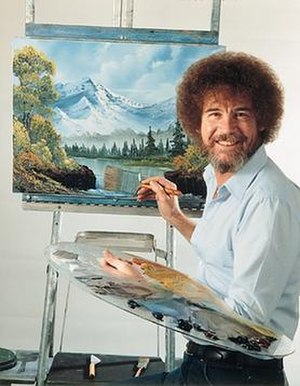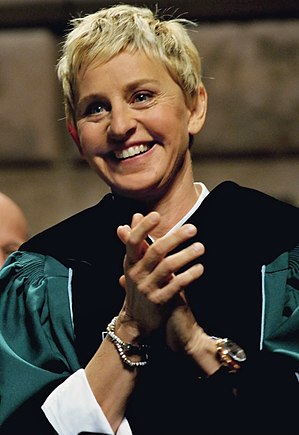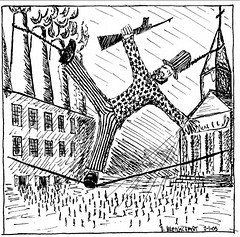People always put the word "kind" to all the weak individuals, but what they do not know is, the reason some of these individuals appear to be "kind" is only because they do not have chance to be evil. --- Hu Ping
I was born a year before Cultural Revolution. I don't remember much of violence diffused all over the country during my childhood. I heard there was a bullet shot on the window of our house (barely two rooms with a small kitchen), which just missed my head, while I was sitting in my nanny's lap. I heard my father's concussion was caused by 4 red guards holding his body upside down, then hitting downward to the floor of the stage - before which some hundreds of people were watching, including me, who was crying. I heard one of professors was tortured, in a way I felt difficulty to describe; I also heard some "rumors" about cannibalism that took place in some countryside of China. Still, rumors were just "rumors", the life of my first 30 years in China was "peaceful" (if we don't count the violence happened within families).
Recently I read part of book: "The Myth of Blood", a book that was written over 20 years ago and finally got published in Hong Kong in 2010. The book documents carefully about the mass massacre that took place in Dao county, Hu Nan province during summer of 1967, right after Cultural Revolution began. The brutality of this massacre was absolutely beyond anyone's imagination - during 3 months of mass murder, over 9000 people died (among which over 1000 committed suicide) in that county alone, most of them by torture. A local river ran red for months. Once this beautiful place was well known for the fishes from river, but after massacre, no one bothered eating fishes for years.
Intrigued by this book, I traced some online sources about another "well-known" massacre took place in Nan Ning county, Guang Xi province. Those sources proved the "rumors" I heard long time ago. This massacre was even more gruesome, mostly due its widely practiced cannibalism. What's even worse than just cannibalism was that the cannibalism here was often "practiced" during victims were still alive. It seems no one really know how many people died in that place during massacre, some sources say 50 or 70 thousands, some say hundreds of thousands. No one knows for sure.
These two massacres were not all happened in countryside of China during Cultural revolution. There were many other places suffered the same horrors. As Deng Xiaoping once said (source from online): we would never know how many people died during Cultural Revolution.
I was shocked, first by the brutality, second by the people who involved - they were mostly "ordinary" people. These massacres were not government "organized", or "state-promoted" crimes, they were "mass movements" that everybody participate (more or less) voluntarily. These massacres usually started by two groups of people who fought violently, yet both sides claimed loyal to Mao and Communism. And when these movement went into absolute chaos, more people involved, then the "excitement" was no longer "political", or "ideological", but absolutely frenzied and devilish.
The details were incredibly gruesome, I think they would be the best described by Mo Yan's style, not mine. However, here are a couple of them I could put in brief: in Dao County's masscare, one person tried to hang himself but he was just a little too late, he was "rescued" by his "enemies", and then tortured in many different ways until he died. During massacre of Guangxi province, it was said one old (ordinary) lady first got a heart from a victim, but after she heard that the organs from died bodies did not have the best curative effect, she threw it away, and eagerly participated the next more frenzied action in order to get a fresher one...
Ignorance does kill!
Honestly speaking, I would prefer these crazy people all had guns, so the victims could depart the earth more mercifully. The fact was, without guns, these Red guards or Red comrades were just become incredibly "creative" on killing. Again, I am not interested in details of those "techniques".
Can we blame this type of crime to Communism, or to Mao, to Chinese government? I simply cannot. It is obvious that most of participants of such movements were volunteer commoners, free to do or not to do anything that they "felt" "right" or "wrong". There were some forced actions, but certainly not all of them (I supposed not even most of them). And there was no law, no moral stance, only evils unleashed. Yes, Mao might be responsible for unleashing such evils.
What continued to strike me is, all these horrors, almost vanished from people's mind immediately after they ended. No body talked abut it, neither no one was punished by laws (of course there was no law). Most of those murderers, those who ate other humans organs, flesh, just went straight back to their "ordinary" life, many of them even played victims of history. It seems some were later arrested for murder, but how those "trials" went I do not know for sure. What I can be quite sure is that majority of these people who committed the most horrible crimes in human history lived peaceful lives until they died, or some of them are still alive. The whole massacres were all forgotten. No one mentioned them at all, until this book of "Myth of Blood".
Or maybe the reason of such crimes were forgotten by many is precisely because they were committed by "many"?
I somehow understand this type of "oblivion", because it is indeed too dark to mention. Except, dark history would not evade repeating itself just because we choose to forget. As matter of fact, similar crimes happened also during Great Leap Forward, which was only several year earlier than Cultural Revolution. "Good" thing is, many crimes - include cannibalism - happened during Great Leap Forward were covered by "starvation" - a much more sound and face saving term than "massacres".
Another side of story is, there are things that Chinese people chose NOT to forget, such as how the intellectuals were persecuted, how the "precious" Chinese tradition was destroyed, etc. Think carefully, it is not that strange at all, because those who write history can choose what to write, what not to write, and in China (also elsewhere), it is "intellectuals" who write history, so "understandably", after cultural revolution, intellectuals' fate was much better documented than those peasants who lived in countryside, despite the fact that what happened in countrysides were much more "serious".
I am not an expert in history, but by my limited knowledge, I still have to say, I simply could not find any part of human history darker than this part of Chinese history. The reason for that is, these massacres were not "wars" between nations, neither state organized, but just "mass movement" consisted of "commoners", yet they reached a stunning level of destruction and brutality.
How could such things happen? If we cannot blame these horrors to minority powerfuls, or those abstract ideas, such as "communism", where can we find an answer for such insanity exhibited by these mass "common" people? Were they just temporarily possessed by Evil?
If so, where does the EVIL come from?













